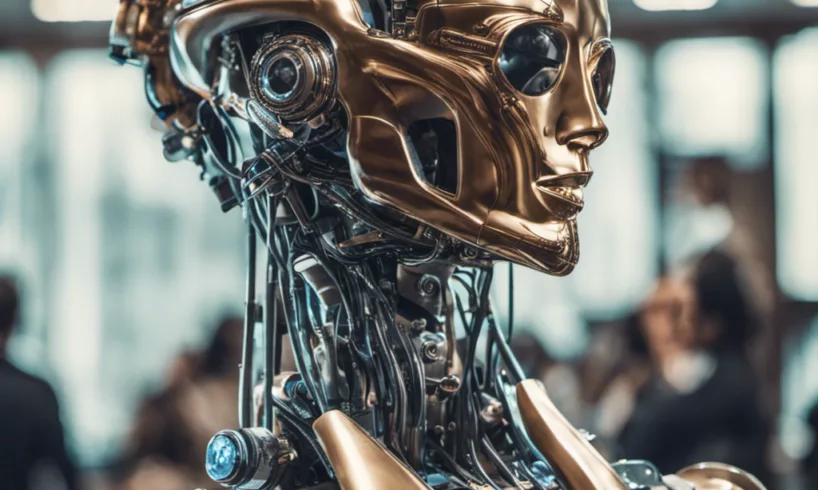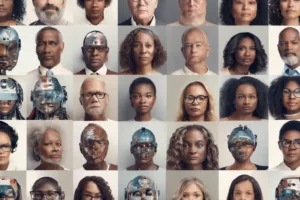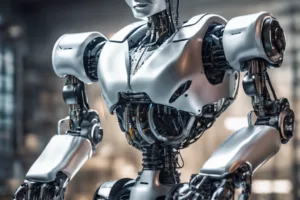
Artificial intelligence is revolutionizing the entertainment industry, creating new opportunities for megastars and raising concerns about copyright and audience engagement.
Artificial intelligence (AI) is no longer confined to mundane tasks; it is now entering the glamorous world of entertainment. With Hollywood at a standstill and musicians facing competition from AI-generated music, the impact of AI on the industry is undeniable. While some stars are concerned about their work being stolen, the rise of the minister suggests that AI will enhance the power and reach of the biggest celebrities. This article explores the history of technology's impact on fame, the current trends in the entertainment industry, and the potential implications of AI for both artists and audiences.
The Era of the Superstar:
Throughout history, technology has consistently reshaped the concept of fame. The advent of reading in the 18th century allowed individuals to achieve true fame within their lifetime. Film and radio initially posed a threat to live performers, but instead, they ushered in the era of the superstar in the 1920s. Television brought famous personalities into every living room, leading to the rise of megastars in the 1960s. As AI-generated content floods the entertainment business, concerns about diluted fame resurface, but history suggests that the outcome may be quite different.
The Power of Megastars:
Despite the vast amount of user-generated content on platforms like YouTube and TikTok, the biggest hits by the most prominent artists continue to dominate. The rise of niche content has not eroded the sales and popularity of star writers, musicians, and actors. Audiences, overwhelmed by choice, rely on algorithmic and human recommendations, which direct them towards the most popular content. AI promises even more choice but will likely lead to higher search costs for audiences, causing them to gravitate towards the top stars.
The Omnipresence of the Omnistar:
AI will enable megastars to be truly omnipresent for their fans. AI-powered dubbing allows actors and podcasters to reach foreign audiences in their language instantly. Video editing can match lip movements to different languages, further enhancing the global reach of stars. AI also solves the problem of crowded schedules, allowing in-demand actors to work together without physically being present. Additionally, digital enhancements can prolong actors' careers and even enable posthumous performances. The potential for stars to perform in emerging formats, such as avatar concerts and celebrity-voiced chatbots, opens up new avenues for fan engagement and monetization.
Copyright Concerns and Legal Challenges:
While the opportunities presented by AI are exciting, artists have legitimate concerns about copyright infringement. Past technologies like the printing press and the internet have required legal frameworks to protect creators' rights. AI-generated content must be regulated to prevent it from becoming a form of piracy. Content creators and tech firms must address permission and fair compensation issues to ensure a sustainable and ethical AI-powered entertainment industry.
The Impact on Audience Engagement:
The age of the minister may present a challenge for audience engagement. AI excels at remixing and regurgitating old material but struggles to replicate the unique human touch that evokes strong emotions. The entertainment market, however, is self-correcting. Audiences can turn a once-hot property into a has-been in an instant. Despite the growth of AI-powered entertainment, audiences continue to crave human drama and value live events like sports. AI will expand the long tail of entertainment, offering deeper niches and personalized content, but audiences will always have the option to change the channel.
As AI continues to reshape the entertainment industry, the minister's rise highlights the potential for megastars to become even more significant. The power of AI to enhance global reach, offer new formats, and satisfy fan demands is undeniable. However, copyright and audience engagement concerns must be addressed to ensure a fair and engaging AI-powered entertainment landscape. Ultimately, the future of entertainment lies in striking a balance between AI-driven innovation and the enduring appeal of human creativity.

George Smith, with over a decade in tech journalism, excels in breaking down emerging tech trends. His work, spanning tech blogs and print, combines in-depth analysis with clarity, appealing to a wide readership. George's pieces often explore technology's societal impact, showcasing his foresight in industry trends.







